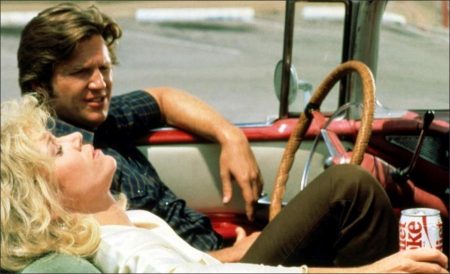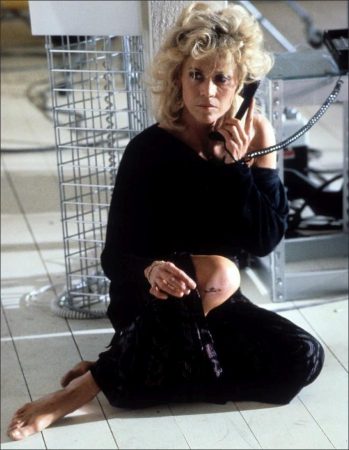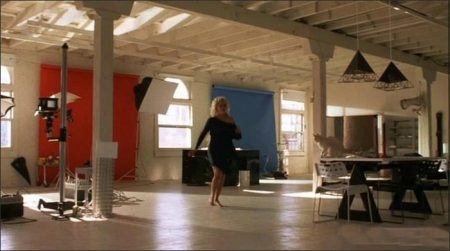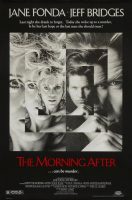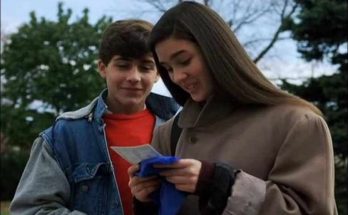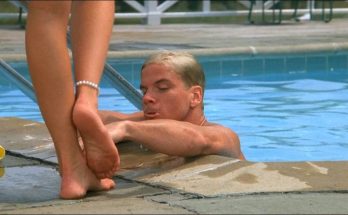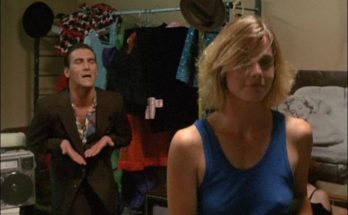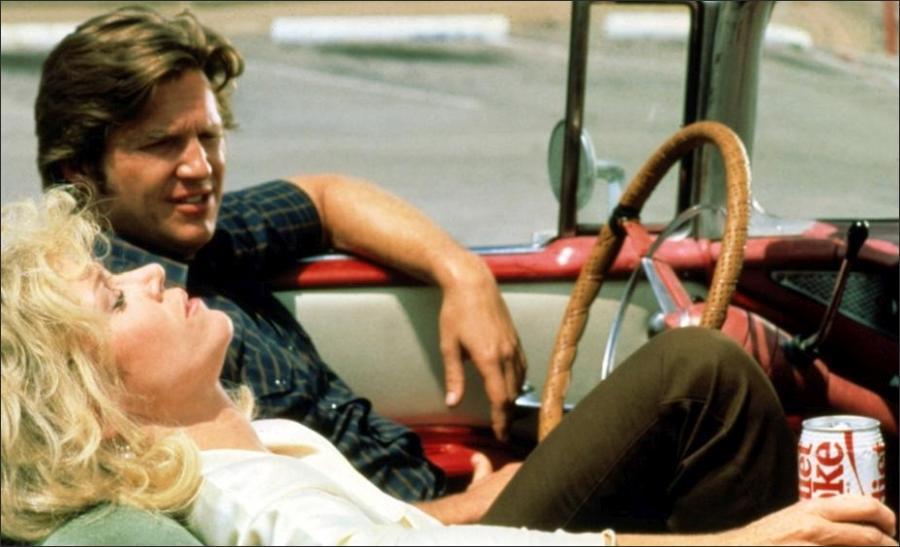Taglines: …can be murder.
The Morning After movie storyline. A washed-up, alcoholic actress, Alex (played by Fonda), wakes up on Thanksgiving Day next to a murdered man, a sleazy photographer. She feels sick and remembers nothing from the night before. She calls her friend Jackie about what happened the night before. (We find out later that he is her husband, they are separated.) He informs her that she missed out on getting what could have been her best gig in a while the night before because she was drunk and rude.
She tells him about the body. He tells her to call the cops and she says that she is scared but he insists, telling her it will be all right. She retorts saying “ya wanna bet?” She leaves the apartment, and it is implied that she has not called the police. While trying to flee at the airport, Alex encounters an ex-policeman, Turner (Jeff Bridges), who believes in her innocence. Raúl Juliá plays Jackie, a hairdresser who wants to divorce her, as he has fallen in love with socialite Isabel Harding (Diane Salinger).
The Morning After is a 1986 American mystery film directed by Sidney Lumet and starring Jane Fonda, Jeff Bridges, Raul Julia, Diane Salinger, Richard Foronjy, Geoffrey Scott, Kathleen Wilhoite, Frances Bergen, Michael Flanagan and Fran Bennett. Jane Fonda was nominated for the Academy Award for Best Actress for her performance.
Film Review: The Morning After
Some movies ease their audiences over the credibility gap by being so apparently reasonable. Since everything else makes sense, we accept the film’s incredible premise and move on. Other films begin so mysteriously that the audience can’t tell right away what’s possible or impossible. ”The Morning After,” Sidney Lumet’s entertaining new romantic thriller, opens by challenging the audience. It says, in effect, believe this or not:
Early one morning a beautiful woman, who turns out to be Alex Sternbergen (Jane Fonda), comes to hazy consciousness in a niftily modern Los Angeles loft apartment, sharing a bed with a man she doesn’t know and, under the circumstances, never will. He’s dead, with a large kitchen knife stuck into his chest. There’s blood all over him and, very quickly, all over Alex.
What would you do if you were Alex? Have hysterics? Call the cops? Flee? Alex pours herself a drink, then dresses. She’s so adept that, though her hands are bloodied, she doesn’t get a spot on her clothes. She can’t call the cops, we eventually learn, because she was once booked for assault with a deadly weapon.
Though she looks as intimidatingly fit as the real-life Jane Fonda, Alex is an alcoholic, so far gone that after even a few drinks she suffers terrible blackout spells. It’s possible, she thinks, that she did stab the guy. She’s also somewhat newsworthy, having been a promising movie actress 20 years earlier. She says gloomily, ”They were grooming me to be the ‘new’ Vera Miles – they were grooming me to replace somebody nobody knew was missing.”
It isn’t initially easy to accept Alex’s behavior in ”The Morning After.” After making a safe getaway from the loft that morning, she returns later in the day to clean up after the killer who, all things considered, is very likely someone else.
Yet once you successfully clear this first hurdle, ”The Morning After” becomes the kind of enjoyable, sophisticated comedy-mystery that requires much more talent to pull off successfully than is usually acknowledged. It may be instantly disposable, but heaven save us from a season of commercial movies that, like sensible shoes, are designed to last forever.
Mr. Lumet’s direction, the bright, sometimes nasty humor of the dialogue by James Hicks (the nom de plume of James Cresson, better known as a producer) and the performances by Miss Fonda and Jeff Bridges, as the eccentric ex-cop who helps Miss Fonda, result in movie making of slick order.
Among other things, ”The Morning After” has an original, sometimes spectacular ”look” that, in its jazzy, overstated way, perfectly reflects the sort of movie it is. Mr. Lumet, the quintessential director of New York-based films, sees Los Angeles as a series of lurid landscapes conceived by an Edward Hopper in a color-enhanced dream. The long, flat, unbroken wall of a warehouse, which would probably be gray or off-white anywhere else, is the color of a tangerine. The sky, at midafternoon, is royal blue. A lawn is so green that it’s like the memory of grass in an early Technicolor movie.
Andrzej Bartkowiak was the cameraman, and Albert Brenner the production designer. Miss Fonda and Mr. Bridges are a winning, very funny pair of unlikely lovers. He’s a born-and-bred redneck with, at first, a racial sensibility to match. (”What are you,” Alex asks him, ”the Klan anthropologist?”) Having been abandoned by his wife, he now lives in the back of a garage with his prized 1956 Chevy and dozens of books he buys by the pound but never reads, including a complete set of Nancy Drew.
Alex lives in a typical Hollywood apartment of modest rent, in what ouwardly appear to be far more genteel circumstances, though her fridge contains nothing but two tacos, a bottle of olives, 6 1/2 jars of mayonnaise and four one-gallon jugs of Thunderbird wine. She makes the occasional television commercial, gets drunk every night, and depends on her husband (Raoul Julia), from whom she’s been amicably separated for 10 years, to see her through periodic depressions.
Mr. Julia is suitably enigmatic as an ambitious hairdresser, the proprietor of a chic Beverly Hills beauty salon not unlike the one out of which Warren Beatty operated in ”Shampoo.” Diane Salinger plays the very social heiress-friend of Mr. Julia, and Geoffrey Scott appears briefly, in a television clip, as the murder victim, a sleazy but successful publisher of girlie magazines.
In fiction of this sort, such men deserve what they get and alcoholics, particularly when played with the kind of intense intelligence Miss Fonda possesses, need never look seriously the worse for wear.
The Morning After (1986)
Directed by: Sidney Lumet
Starring: Jane Fonda, Jeff Bridges, Raul Julia, Diane Salinger, Richard Foronjy, Geoffrey Scott, Kathleen Wilhoite, Frances Bergen, Michael Flanagan, Fran Bennett
Screenplay by: James Cresson
Production Design by: Albert Brenner
Cinematography by: Andrzej Bartkowiak
Film Editing by: Joel Goodman
Costume Design by: Ann Roth
Set Decoration by: Lee Poll
Art Direction by: Kandy Stern
Music by: Paul Chihara
Distributed by: 20th Century Fox
Release Date: December 25, 1986
Views: 205
